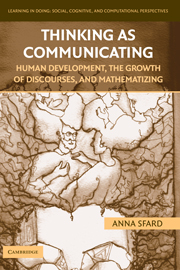Book contents
- Frontmatter
- Contents
- Series Foreword
- Introduction
- Acknowledgments
- Part I Discourse on Thinking
- 1 Puzzling about (Mathematical) Thinking
- 2 Objectification
- 3 Commognition: Thinking as Communicating
- 4 Thinking in Language
- Part II Mathematics as Discourse
- Glossary of Commognition
- References
- Name Index
- Subject Index
- Titles in the series
4 - Thinking in Language
Published online by Cambridge University Press: 27 July 2009
- Frontmatter
- Contents
- Series Foreword
- Introduction
- Acknowledgments
- Part I Discourse on Thinking
- 1 Puzzling about (Mathematical) Thinking
- 2 Objectification
- 3 Commognition: Thinking as Communicating
- 4 Thinking in Language
- Part II Mathematics as Discourse
- Glossary of Commognition
- References
- Name Index
- Subject Index
- Titles in the series
Summary
Without speech man would have no reason and no reason is possible without speech.
Johann Gottfried von Herder[Development of mathematics is] enlargement of the mathematician's self-consciousness … a long, difficult, and extended exercise in which the human mind attempts to catch sight of itself catching sight of itself, and so without end.
David BerlinskiIn the last chapter, while defining thinking as individualized communication, I was careful to stress that all forms of communication need to be considered, not just verbal. Such an all-inclusive approach was necessary to ensure that the resulting definition of thinking does not leave out some of the phenomena that are commonly regarded as cases of thinking. This said, it is now time to give linguistic communication the attention it certainly deserves. This chapter is devoted to the conjecture that linguistic commognition is the primary source of perhaps the most human of our distinctively human properties: of our propensity for accumulation of complexity. More specifically, I will be arguing that this special human ability, along with many others, originates in our ability to “turn discourse on itself,” that is, to communicate about communication. This realization will eventually make me claim that what is traditionally called human development may now be considered as almost tantamount to the development of discourses.
Before addressing any of these all-important issues, however, let me take a closer look at the historical debate about relations between thinking and one particular form of communication called – speech.
- Type
- Chapter
- Information
- Thinking as CommunicatingHuman Development, the Growth of Discourses, and Mathematizing, pp. 94 - 124Publisher: Cambridge University PressPrint publication year: 2008

